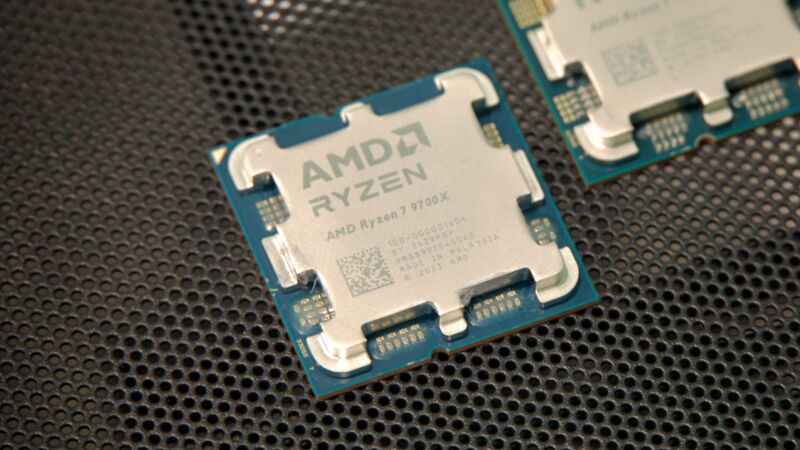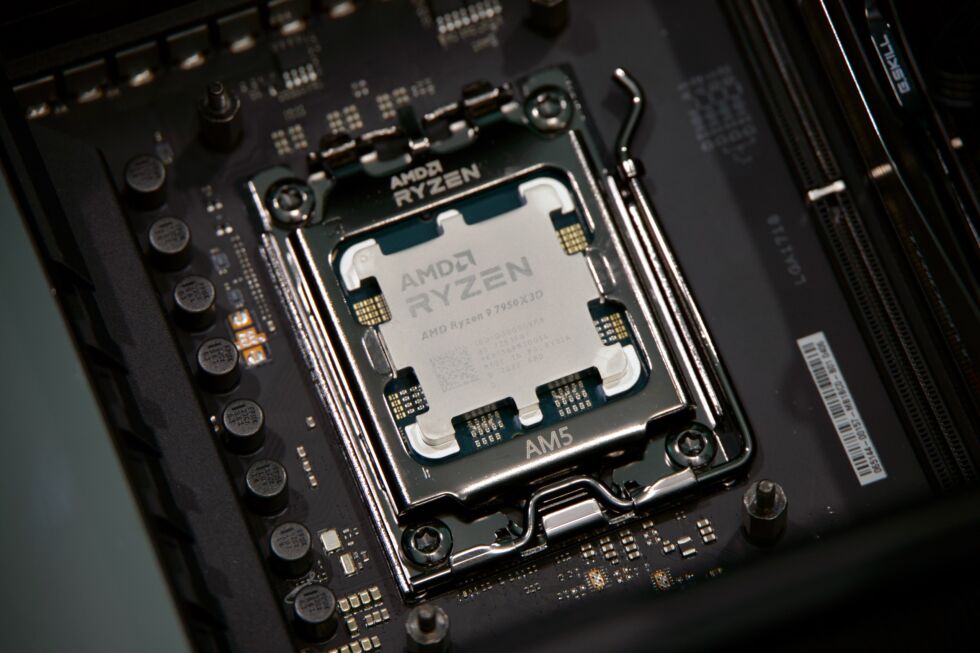Improved branch prediction in Windows 24H2 should help all recent Ryzen CPUs.

AMD recently released its Ryzen 9000-series processors, which brought the company’s new Zen 5 CPU architecture to desktops for the first time. But we (and multiple other reviewers) had issues getting the chips’ performance to match up to AMD’s promises, something that the company wasn’t able to fully resolve before the processors launched to the public.
AMD has since put out statements explaining some of the discrepancies and promising at least partial fixes for some of them.
A Windows problem
The main fix for slower-than-expected game performance, the company says, will come with the Windows 11 24H2 update later this year, which will include “optimized AMD-specific branch prediction code” that improves Ryzen 9000’s performance by between 3 and 13 percent in an AMD-provided cross-section of games and benchmarks (though a handful of tests also showed no change). AMD says that these improvements will also benefit Zen 3- and Zen 4-based Ryzen processors, but that “the biggest boost” will be reserved for Ryzen 9000 and Zen 5.
Apparently, this branch prediction code improvement is already available in current Windows builds if you’re running games and apps in Administrator mode, which AMD used to run its tests. From AMD’s post, it’s unclear whether it was running games from within the normally disabled Administrator account, as has been reported elsewhere, or if it was merely running them in Administrator mode from within a standard user account.
Ars Video
How Scientists Respond to Science Deniers
In any case, even a standard user account with Administrator permissions spends most of its time running in a standard user mode, throwing up a User Account Control elevation message when Administrator privileges are needed for something. For security reasons, Windows only runs software in Administrator mode when it’s required, generally to install an app for the first time or make other system-wide changes. Virtually no one will be running games with Administrator privileges or while logged in as Administrator, which makes it an odd testing choice. Regardless, the 24H2 update should make those branch prediction improvements available to standard user accounts running in user mode.
The Windows 11 24H2 update should be released to the general public this fall, though Windows Insiders can also get it from the Insider Preview channel or by downloading an ISO. The 24H2 update is already the default version of Windows on Copilot+ PCs and on the Ryzen AI-powered Asus laptop we tested recently, so for most people it should be stable and reliable enough for day-to-day use.
There’s no word on whether or when these changes might come to Windows 10. But as with Intel’s Thread Director, which is not optimized for Windows 10, I wouldn’t count on AMD or Microsoft working very hard to bring significant performance improvements to a last-generation operating system that is just over a year away from its end-of-support date, even if it is still Steam’s most popular Windows version by a handful of percentage points.
A driver problem

Speaking to Tom’s Hardware, AMD also said that an update to its chipset drivers could resolve some performance issues that reviewers had, though regular users are less likely to run into them.
Starting with the Ryzen 7900X3D and 7950X3D chips, AMD’s chipset drivers have included a “core parking” capability that will totally shut off specific CPU cores when they detect that an app that benefits from higher single-core performance is running. For the X3D chips, this was specifically meant to keep games and other apps running on the cores that had access to the 3D V-Cache, and not on the standard Zen 4 cores that didn’t have the extra cache.
Ryzen 9900X and 9950X don’t have the extra cache, but the drivers can still park their cores to try to boost gaming performance—if fewer cores are actively engaged, most CPUs will allow those cores to boost to slightly higher clock speeds. The problem is that, once installed, AMD’s drivers will apparently keep parking cores on all Ryzen 9000 CPUs, even lower-core-count ones that don’t benefit from it. AMD says the only way to stop this from happening, currently, is to completely reinstall Windows.
This won’t be a problem for most users, who buy a single CPU and install it and then use it for years without swapping it out. But many reviewers (including Ars) swap CPUs in and out of the same motherboard without altering the Windows install. AMD says that it aims to have the issue resolved by the time the 9000X3D-series CPUs are rolling out, though the company hasn’t said exactly when that will be.
Other problems?
Neither AMD’s blog post nor the Tom’s Hardware interview mentions the specific fix that AMD recommended to us during our testing—when using DDR5-6000 with EXPO or XMP overclocking profiles, the company advised us to set the processor’s SoC voltage from the default 1.25V to 1.2V and the Infinity Fabric clock speed (FCLK) to 2000 MHz manually in the BIOS. This may have been a peculiarity specific to our Asus motherboard, but they suggest that additional BIOS updates will also be needed to get Ryzen 9000 CPUs performing as intended.
Finally, AMD’s blog post blamed differences in reviewers’ testing configurations for some of the discrepancies between its numbers and the numbers that reviewers saw.
AMD says it tests with Windows’ Virtualization-Based Security (VBS) enabled, where the conventional wisdom for many PC gamers is to turn it off to improve performance (we test with it turned off). AMD also tests Intel chips with DDR5-6000 and Intel’s default power settings enabled, where reviewers test with all kinds of different RAM speeds and power settings (we test Intel CPUs with DDR5-6000 and the default power settings and note where we’re using more conservative or aggressive power limit settings).
Between these specific Ryzen 9000 issues, the Windows improvements that could also affect Zen 3 and Zen 4 performance, and Intel’s recent microcode patch to prevent its own high-end CPUs from frying themselves, our next major CPU review will include lots of retesting to make sure that our numbers match up with what users will see in the real world. If we make any other earth-shaking discoveries as we go through that process, we’ll share them.




